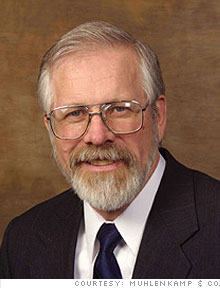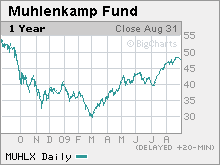Investing in the 'new normal'
There's no question that this isn't a typical recession, and money manager Ron Muhlenkamp says it's time to reset expectations.
 |
| Ron Muhlenkamp: "In my business, you make money on the difference between perception and reality." |

NEW YORK (Fortune) -- Money manager Ron Muhlenkamp gets a lot of credit for his bold, macro-driven investing style, and he deserves it: His namesake fund has returned 9% annually over the last 15 years, 2% better than the S&P 500.
Last year, however, his portfolio took a heavy blow: The Muhlenkamp Fund (MUHLX), which owned holdings in the insurance and mortgage sectors, lost 40% of its value, worse than the blue-chip index.
But when the market was at its nadir, Muhlenkamp hunted for values, picking up shares of beaten-down names like IBM (IBM, Fortune 500) and Legg Mason (LM, Fortune 500). Those picks have since soared, and his fund has recouped much of its losses: It's up 25% so far this year, 18 points higher than other large-value funds, according to Morningstar.
Despite his improved outlook, the manager, who lives on a farm in Western Pennsylvania and loves Harley Davidson motorcycles (he believes Harley's (HOG, Fortune 500) stock is an economic bellwether), says the days of go-go growth are over.
"We fell off a cliff last fall, and things have basically flatlined," he said in a recent conversation with Fortune. "This is not a normal cyclical recession -- this time, people have reset their expectations."
In your latest quarterly letter to shareholders, you wrote that the economy is setting a lower base for expansion. How will that affect the market?
A lot of folks talk about "the new normal." The consumer went from spending 100% to 95%. If you drop by 5%, it takes three years just to get back to where you were. During that time, margins are going to be tight. Every industry we can find has ample capacity, and profitability is going to be less than what it was.
For the market, fair value today is about 15-20% lower than what it was a year ago. We think there will be a 15% drop in return on equity, our favorite metric. Price to earnings ratios should be below what they were.
Does "the new normal" offer any opportunities for growth?
In 2001, we had a normal recession. Coming out, we owned a lot of homebuilders and discretionary stocks, but the things that lead one expansion don't lead the next. If I'm right and the consumer has really cut back this time, then you want to go where the consumer is going with his savings. So there's that extra 5% -- where does it go?
One area where I think there's going to be huge demand is financial advice. What I haven't been able to get a handle on is -- which vendors of financial advice still have a good reputation?
Right now, we own Bank of America (BAC, Fortune 500), which, along with Merrill Lynch, serves some 50% of the households in the U.S. If they can capitalize on that, there's a huge opportunity.
You wrote this spring that you were puzzled by the continued decline in share prices of "great companies." Since then, many blue-chip stocks have bounced back. Is it time to look at lesser known names?
The little stuff has come back more, and all year we've found more value in the big stuff. Size is irrelevant, though. If companies earn good money over time and don't blow it, their stocks will reflect that. Cisco (CSCO, Fortune 500) or IBM or Oracle (ORCL, Fortune 500) at 12 times earnings? That's a good bet.
They're world class companies that sell to a world market. As China and India and Brazil grow faster than the U.S., that's a way I can participate with accounting I trust.
Nearly a quarter of the stocks in your portfolio are in the health care sector, including managed care company UnitedHealth. Are you worried about headwinds from potential reform?
How can you have a health care system without UnitedHealth (UNH, Fortune 500)? The best time to buy pharmaceutical or health care stocks has always been in election years, because that's when everyone beats up on the industry. Right now, any positive news about health care would be a surprise.
In my business, you make money on the difference between perception and reality. When everyone expects the bad, that's when you get the chance to buy Pfizer (PFE, Fortune 500), which we own, for cheap.
Is there any sector you're bearish on?
We don't own any utilities -- the time to own them was last year. Of course, we didn't own them then (laughs). If we're any good at picking and choosing stocks, we should do better than utilities. They generate average returns, and I've never aspired to be average. ![]()
-
 The retail giant tops the Fortune 500 for the second year in a row. Who else made the list? More
The retail giant tops the Fortune 500 for the second year in a row. Who else made the list? More -
 This group of companies is all about social networking to connect with their customers. More
This group of companies is all about social networking to connect with their customers. More -
 The fight over the cholesterol medication is keeping a generic version from hitting the market. More
The fight over the cholesterol medication is keeping a generic version from hitting the market. More -
 Bin Laden may be dead, but the terrorist group he led doesn't need his money. More
Bin Laden may be dead, but the terrorist group he led doesn't need his money. More -
 U.S. real estate might be a mess, but in other parts of the world, home prices are jumping. More
U.S. real estate might be a mess, but in other parts of the world, home prices are jumping. More -
 Libya's output is a fraction of global production, but it's crucial to the nation's economy. More
Libya's output is a fraction of global production, but it's crucial to the nation's economy. More -
 Once rates start to rise, things could get ugly fast for our neighbors to the north. More
Once rates start to rise, things could get ugly fast for our neighbors to the north. More







